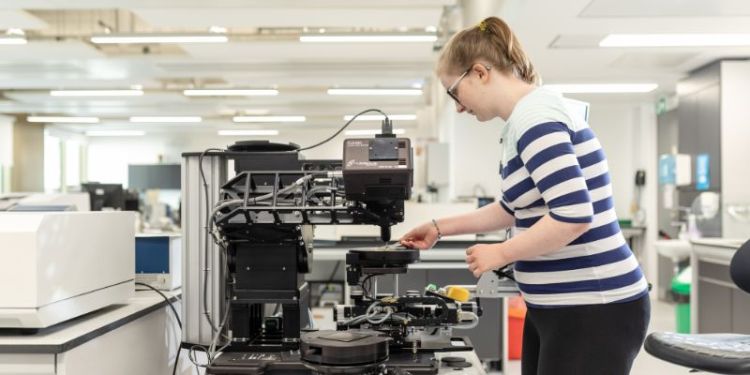Project work

All of our physics courses allow you to benefit from hands-on learning at every stage of the course. This ethos is embedded within both the compulsory and optional modules of our Physics and Physics with Astrophysics courses. Our Theoretical Physics courses will help you engage in theory projects that enable you to contact research on unraveling the mysteries of nature. Our program provides several opportunities for hands-on theoretical exploration, allowing you to contribute to the advancement of scientific knowledge.
An independent research project forms a significant part of the final year of all of our physics courses. Your project gives you the chance to work with one of our internationally-renowned research groups.
Year one
The first year of all of our physics courses introduces you to university-level experimental physics through laboratory classes. Lab classes bring the theory you’re learning in lectures to life; experiments are drawn from atomic physics, optics, thermal physics, and electromagnetism.
In addition to the practical physics skills that you’ll develop from these classes, you’ll start building up transferable skills that will be essential for you in the workplace. You’ll improve your communication skills through presentations and group work.
Computer programming is a crucial part of physics. Programming skills are also highly sought after by graduate employers. Physics, Physics with Astrophysics, and Theoretical Physics students will be introduced to Python, a general-purpose programming language with many applications. You’ll look at basic syntax and programming logic.
Year two
Physics and Physics with Astrophysics students continue with lab classes in their second year. You’ll undertake investigations across a wide-range of areas of physics, including computer interfacing, electronics and mechanical workshop practice. Students on a Physics with Astrophysics course will utilise our observatory and state-of-the-art equipment to produce a colour image of an object.
Computational physics is a compulsory aspect of the second year of our Physics and Physics with Astrophysics courses, and is an option for Theoretical Physics students to choose. Building on what you learnt in year 1, you’ll focus on using Python as a tool for plotting, non-linear curve fitting and file handling.
Year three
There are several optional modules in the third year of our courses that explore physics in practice and are designed to enhance your employability:
-
Professional Skills in Physics: This module, which is compulsory for BSc students and available as an option for MPhys, BSc students, prepares you for working life. You’ll develop skills that are relevant to whatever arena you wish to work in – from CV and application form writing to communicating to different audiences. The module also improves your problem-solving abilities and encourages to you engage with current issues in science.
-
Group Industrial Project: Available as an optional module for Physics, Theoretical Physics and Physics with Astrophysics students, this module involves working on a real project set by an external company. You’ll work in a group on a specific problem and deliver your project to your industrial contact. This is an excellent module if you don’t want to commit to undertaking a year in industry but would like to gain similar experience.
-
Physics in Schools: This module is ideal if you’re considering a teaching career. You would be placed in a local secondary school or sixth form college and organise physics-related activities, either through lessons or clubs. The activities you’d design would promote the excitement of physics, which is rewarding for yourself and your pupils.
Students on a BSc programme complete a research project or dissertation at this stage. You will choose a topic and execute and analyse the results of an experiment or investigation. This is an exciting opportunity to work with researchers who are working at the cutting-edge of physics.
The third year of our Physics and Physics with Astrophysics MPhys programmes includes an advanced experimental techniques module. Over the course of the module, you’ll undertake 4 “experimental mini-projects”. The topic of your project can range from optical tweezers to nuclear magnetic resonance to crystal growth and characterisation. This is an exciting module that develops both physics and transferable skills.
Year four (Integrated Masters)
If you didn’t undertake the Physics in Schools or Group Industrial Project module in your third year, you have the option of taking either the Advanced Physics in Schools module or Advanced Group Industrial Project module in your fourth year. These are exciting modules that apply physics in a real-world context.
For your final-year project, you’ll work as part of an internationally-recognised research team or alongside a leading researcher on an open-ended project. Your project will relate to a current active field of research. You’ll plan and organise your work, follow it through and present your results. This is a wonderful opportunity to contribute to the latest physics research and many of our students have had their final-year projects published.

